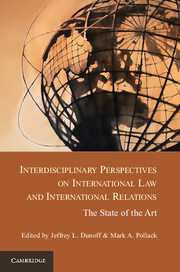 Interdisciplinary Perspectives on International Law and International Relations
Interdisciplinary Perspectives on International Law and International Relations Perspectives from IL/IR Theory
Published online by Cambridge University Press: 05 January 2013
This chapter is about law-making by international organizations (IOs), or what I call “delegated law-making” for short. It is a complex phenomenon, not least because the scope of matters covered by both “law-making” and “delegation” is contested. Although some intergovernmental organizations have been empowered to make law explicitly, the relationship between states and the organizations they create is often more complicated than the term delegation connotes. Various strands of international law (IL) and international relations (IR) theory shed light on this relationship, and, as such, delegated law-making is a good laboratory for exploring the value of cross-disciplinary theorizing.
The chapter begins with the concept of delegation, arguing that it comes in three forms when applied to IOs: explicit, implied, and attenuated. The second section, “Law in Its Infinite Variety” is devoted to law-making. I present a pluralistic conception of law that includes five distinct types of IO acts or instruments: treaty law, legislation and regulation, executive decisions, soft law, and judge-made law. I provide examples to illustrate the extent to which delegation tends to be implied and attenuated, as well as explicit.
To save this book to your Kindle, first ensure no-reply@cambridge.org is added to your Approved Personal Document E-mail List under your Personal Document Settings on the Manage Your Content and Devices page of your Amazon account. Then enter the ‘name’ part of your Kindle email address below. Find out more about saving to your Kindle.
Note you can select to save to either the @free.kindle.com or @kindle.com variations. ‘@free.kindle.com’ emails are free but can only be saved to your device when it is connected to wi-fi. ‘@kindle.com’ emails can be delivered even when you are not connected to wi-fi, but note that service fees apply.
Find out more about the Kindle Personal Document Service.
To save content items to your account, please confirm that you agree to abide by our usage policies. If this is the first time you use this feature, you will be asked to authorise Cambridge Core to connect with your account. Find out more about saving content to Dropbox.
To save content items to your account, please confirm that you agree to abide by our usage policies. If this is the first time you use this feature, you will be asked to authorise Cambridge Core to connect with your account. Find out more about saving content to Google Drive.